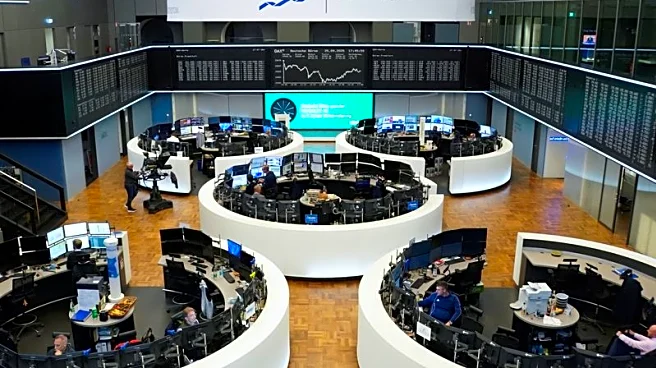A look at the day ahead in European and global markets from Rae Wee
Just as the word was slowly fading away from the memories of investors, it has been foisted upon them again. Asian share markets slumped
on Friday after U.S. President Donald Trump made his latest tariff salvo, and attention now turns to Europe.
Trump on Thursday unveiled punishing tariffs on a broad range of imported goods, including 100% duties on branded drugs and 25% tariffs on heavy-duty trucks, set to take effect from October 1.
He also said he would start charging a 50% tariff on kitchen cabinets and bathroom vanities and a 30% tariff on upholstered furniture.
It remains unclear if the new levies would apply on top of national tariffs or whether economies with trade deals such as the European Union would be exempted.
The Trump administration's trade deals with Japan, the EU, and the United Kingdom include provisions that cap tariffs for specific products such as autos, semiconductors and pharmaceuticals, which means the new higher national security tariffs likely won't raise them above agreed rates.
Global drugmakers have also preemptively scrambled to shore up their U.S. manufacturing capacity and domestic inventory.
The new 100% tariff on any branded or patented pharmaceutical product will apply to all imports unless the company has already broken ground on building a manufacturing plant in the United States, said the president.
He also said companies such as Paccar-owned Peterbilt and Kenworth and Daimler Truck-owned Freightliner could benefit from the tariffs on heavy-duty trucks.
The reaction in Asia has been a heavy selloff in drugmakers across the region, while an index tracking Chinese-listed furniture makers slid more than 1%.
As it is, global equities had already been struggling on the back of receding U.S. rate cut expectations after a slew of data on Thursday underscored resilience in the world's largest economy.
That threw into question the need for more aggressive policy easing by the Federal Reserve, with traders moving quickly to scale back bets of future rate cuts.
Markets are now pricing in just about 39 basis points worth of easing by December this year, compared to more than 40 bps earlier this week.
Fed policymakers have largely signalled restraint in cutting rates further, citing concerns that tariffs could push inflation up.
But the central bank's newest policymaker, Stephen Miran, continued on Thursday to press for sharp U.S. interest-rate cuts to prevent a labour market collapse.
Investors will get a better read on the U.S. economy later on Friday with the release of the PCE data, where expectations are for the core PCE price index to have risen 0.2% in August, compared with July's 0.3% increase.
Key developments that could influence markets on Friday:
- US PCE data (August)
- Fed's Barkin, Bowman speak
(Editing by Muralikumar Anantharaman)









